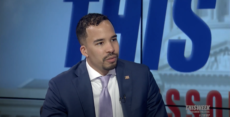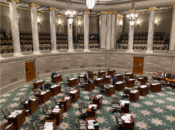The Missouri House passed the Second Amendment Preservation Act, and I noticed some objections to it as unconstitutional because it violated the Supremacy Clause. Therefore, I thought it might be helpful if we took a closer look at the Supremacy Clause and some background case law.

Here is how the Supremacy Clause reads: “This Constitution, and Laws of the United States which shall be made in Pursuance thereof; and all Treaties made; or which shall be made, under the Authority of the United States; shall be the supreme law of the Law of the Land; and the judges in every State shall be bound thereby, any thing in the Constitution or Law of any State to the Contrary notwithstanding.”
The Supremacy Clause says the Constitution is the supreme law, and it also serves to clarify to states that the Constitution gives the federal Congress and the president certain authority. We often say the Bill of Rights is a list of negative rights. It is a series of caveats upon the powers listed in Articles I, II, III. For example:
- “Congress shall make no law…”
- “The right of the people to keep and bear arms shall not be infringed.”
- “No soldier shall in time of peace be quartered…”
- “No warrant shall issue but upon probable cause.”
The Bill of Rights is a list of things the government cannot do to people, and the Supremacy Clause is not a shield to the government if it either goes beyond the powers delineated in the structural portions of Article I or if it violates one of the shall nots in the amendments.
We can see an application of this in the U.S. Supreme Court case Printz v. United States (1997). The Brady Bill signed into federal law by President Bill Clinton in 1993 required, among other things, local law enforcement to determine whether the federal firearms laws were being broken. The plaintiffs, who included Sheriff Jay Printz, filed suit arguing that Congress could not force local sheriffs to execute federal law. In the case’s dissenting opinions, it was argued that if a state refused to participate, such refusal would be unconstitutional under the Supremacy Clause.
Justice Antonin Scalia, delivering the opinion of the Court, found that the Brady Act was a commandeering of the state sheriff’s departments which in itself violated the 10th Amendment. Here are some quotes from the opinion which became operative constitutional law:
- “It is incontestable that the Constitution established a system of ‘dual sovereignty.’ Although the States surrendered many of their powers to the new Federal Government, they retained ‘a residuary and inviolable sovereignty.’ (Federalist No. 39).”
- “For these reasons, we do not think the early statutes imposing obligations on state courts imply a power of Congress to impress the state executive into its service. Indeed, it can be argued that the numerousness of these statutes, contrasted with the utter lack of statutes imposing obligations on the States’ executive (notwithstanding the attractiveness of that course to Congress), suggests an assumed absence of such power.”
- “The Framers rejected the concept of a central government that would act upon and through the States, and instead designed a system in which the State and Federal Governments would exercise concurrent authority over the people.”
- “The Federal Government’s power would be augmented immeasurably and impermissibly if it were able to impress into its service-and at no cost to itself-the police officers of the 50 States.”
I suppose you could argue Missouri’s Second Amendment Preservation Act was actually written by Justice Scalia in 1997. The Constitution establishes federalism. In horizontal federalism, power is diffused, and there are checks and balances between three co-equal branches of the government. In vertical federalism, power is diffused and there are checks and balances between the state and national governments. Power is not absolutely concentrated in either the central government or the various state governments, and additionally there exist certain inviolable trespasses not to be committed by any government within the United States.
I use Justice Scalia’s phrasing of residuary sovereignty for states. I do not typically use the phrase “states’ rights.” (Although, use of the phrase doesn’t bother me.) The phrase “states’ rights” doesn’t appear in the Constitution. A person has rights, and a state has powers which are given to it by the people. If you need a textual confirmation of these semantics, here’s the language from the 9th and 10th Amendments:
- 9: “The enumeration in the Constitution, of certain rights, shall not be construed to deny or disparage other retained by the people.”
- 10: “The powers not delegated to the United States by the Constitution, nor prohibited by it to the States, are reserves to the States respectively, or to the people.” (Emphasis with both is my own.)
So, it is the people who have rights inherently and prescriptively as human beings. The people then delegate power to government in order to preserve those rights. The United States and 50 state constitutions are macro-delegations of power to government which, in effect, charter these respective sovereign governments of America within certain lines of authority.
I could provide case after case which makes it clear state law enforcement officers and state prosecutors do not have subject matter jurisdiction when it comes to enforcing and prosecuting federal law. I could also point you to case law which informs us that while the federal government can entice states, it cannot force states to participate in its programs. We can also consider New York v. United States (1992) which holds that the federal government cannot order a state to pass a law.
I hope you can see this debate is about the Second Amendment, but it is also about the purpose of the Constitution itself. We the people should give the government those powers which are necessary to protect our country, protect the people, and protect our freedom, but we should never entertain the concept that we have given the government absolute power. All the powers of the government are derived from We the People. However, our rights as individuals do not originate from the government.

Bill Hardwick represents HD 122 in the Missouri House. He is licensed to practice law in Missouri and holds a Juris Doctor from the University of Missouri.


















